Pitch Night 2018
Incubator at Sasaki
Sasaki Foundation
We leverage design to tackle global challenges—especially those that adversely affect certain communities.
Grants Process
In 2018, we launched a call for proposals for our inaugural Design Grants. We received more than 100 inquiries, and approximately two dozen team submissions, from throughout the United States and six countries. Applicants created projects that focused on ten Greater Boston neighborhoods and three Gateway Cities within Massachusetts.
Explore the 2018 winners and finalists below, and learn more about our 2018 call for proposals.
The call for proposals
Resilient communities are strong communities.
Unfortunately, some communities—especially those that are primarily people of color or historically low-income—are disproportionately impacted by environmental, economic, and social challenges. And yet, when we design the built environment to address these challenges, the voices of the residents are often left out of the process.
The Foundation is focused on issues of resiliency—proactive approaches to climate adaptation, housing, transit, and placekeeping. While these issues are felt throughout the world, we find many impacted communities right here in Massachusetts. We issued a call for proposals to find projects we could support that engaged communities in the Gateway Cities, Metro West, and Greater Boston.
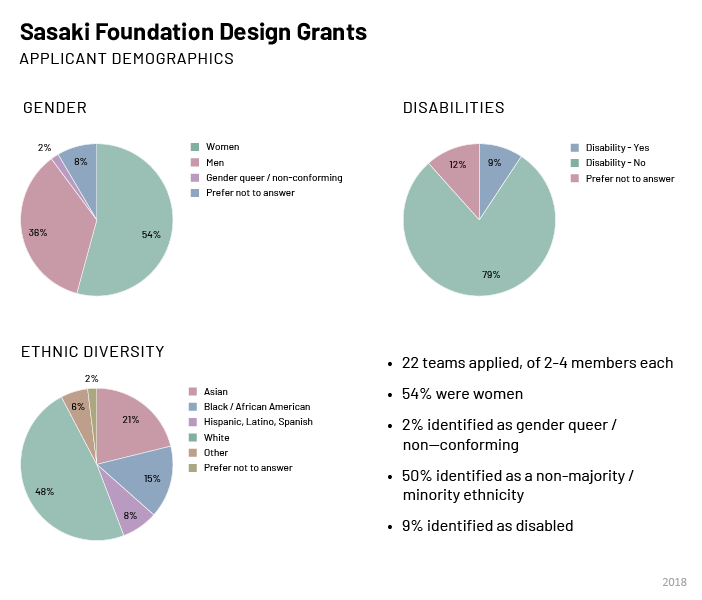
The Grant Winners
Charles River Floating Wetland
Proactive Approaches to Climate Adaptation
Laura Jasinski, Vanessa Nason, Max Rome, Pennie Taylor
In 1995, the EPA launched the Charles River Initiative, which included the objective of a swimmable river. Although significant progress has been made through vast reduction of combined sewer overflows, this goal remains elusive. Our project explores a complementary approach aiming to reduce harmful algal blooms by enhancing zooplankton populations using floating wetlands. The goals are to create a visually impactful wetland installation, document the impact on zooplankton population and water quality, and educate the public about the relationship between river ecology, pollution, and water quality in order to work toward a healthy and swimmable Charles.
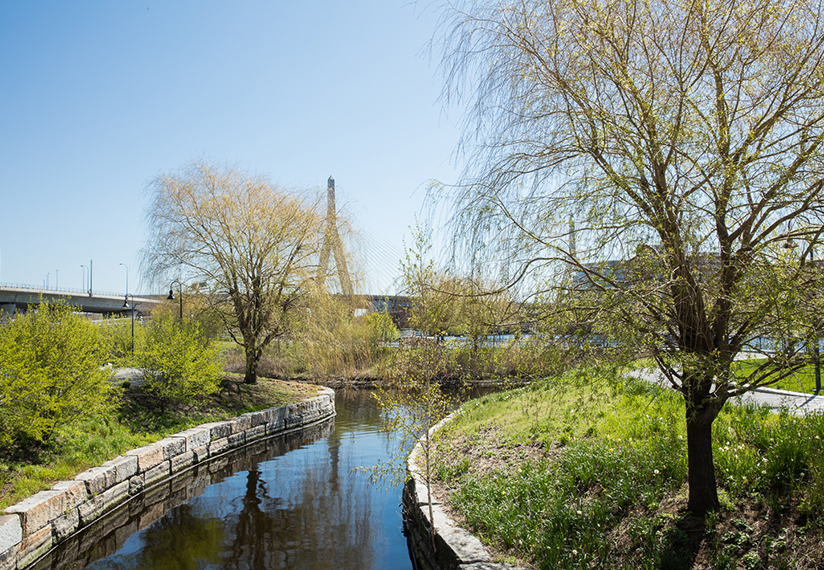
North Point Park
Photo by Aaron Bourque, courtesy Charles River Conservancy
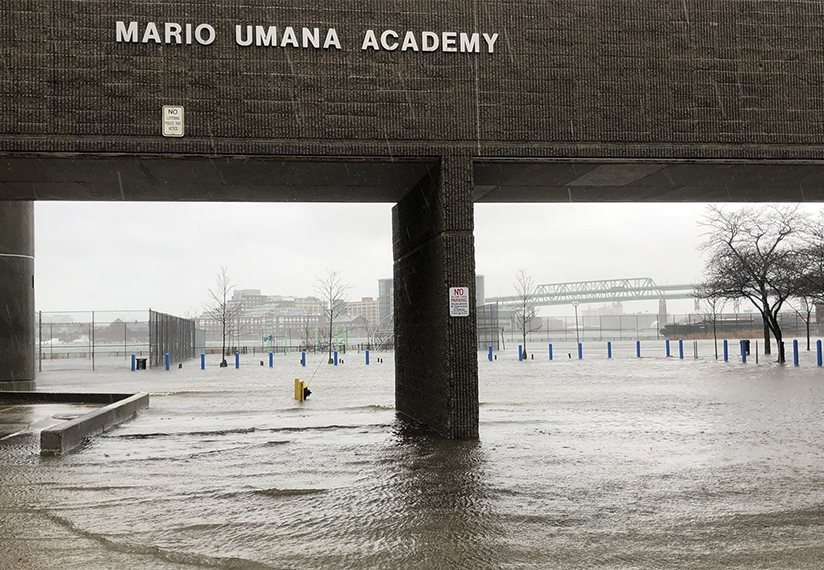
Flooding at Mario Umana Academy in East Boston
Photo courtesy the Harborkeepers
Eastie for Eastie
Proactive Approaches to Climate Adaptation
New Models for Housing
Collyn Chan, Mario Giampieri, Kelly Main, Kannan Thiruvengadam
East Boston is a coastal neighborhood faced with rising sea levels and intensifying development pressure. Instead of trying to strictly preserve in place or be pushed out as development pressure increases, this project promotes using land pooling, land readjustment, and community land trusts as an alternative path forward. We will engage with several community partners to identify barriers to climate adaptation faced by residents in Eastie. Through a participatory design process, the team will co-create a series of design and policy proposals that Eastie can use to stay in place, preserve or increase housing availability, and minimize climate-change related risk.
The ECHOLocator: Expanding Choice in Housing Opportunities
New Models for Housing
Innovation in Transit and Access to Mobility Choices
Nicholas Kelly, Anson Stewart, Robert Terrell
Low-income tenants face significant housing barriers when attempting to rent housing in the Boston metropolitan area, deepening segregated housing markets throughout the region. A new digital interface, the ECHOLocator, will provide housing choice voucher holders with customizable information on communities that are both affordable and serve their public transit needs. We will use this opportunity to pilot and refine the tool alongside our clients, as well as expand it across our 15,000+ voucher holders and to housing authorities nationwide.

The ECHOLocator
Image courtesy Conveyal
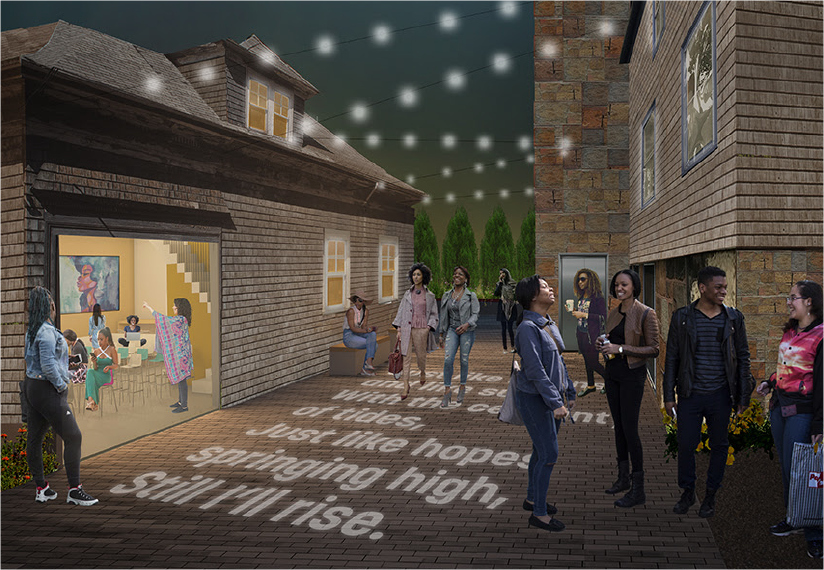
G|Code House rendering
Image courtesy Sasaki
G|Code House
New Models for Housing
Creative Community Building
Rizel Bobb-Semple, Lindsay Nuon, Bridgette Wallace
G|Code House is a proposed pilot program that will serve young women of color ages 18 to 25 who have an interest and/or aptitude for computers or technology, but don’t know how to develop their interest or understand the opportunities. Designed as a co-living, -learning, and -working community, these women will attain technology instruction and skills, gain employment experience, and find support in a safe, focused home. The house is designed to improve outcomes of disconnected youth. The program consists of nine months of in-class training, six months of an internship/co-op, and nine months of specialty training.
Please Touch the Art
Creative Community Building
Karissa Coady, Sandra Jaffe, Matt Jatkola, Georgina Kleege, Tanja Milojevic, Aneleise Ruggles
“Please Touch the Art” is a tactile art exhibit and companion humanities exhibit accompanied by a curator’s talk and panel discussion at the Mosesian Center for the Arts. The exhibit will provide a multi-sensory art experience that is accessible to all audiences, taking special care to provide an immersive, tactile experience for visually impaired community members. Blind scholar and More than Meets the Eye, What Blindness Brings to Art author Georgina Kleege will guest curate. The exhibit will include a gallery that is dedicated to the history of accessibility in arts programming.
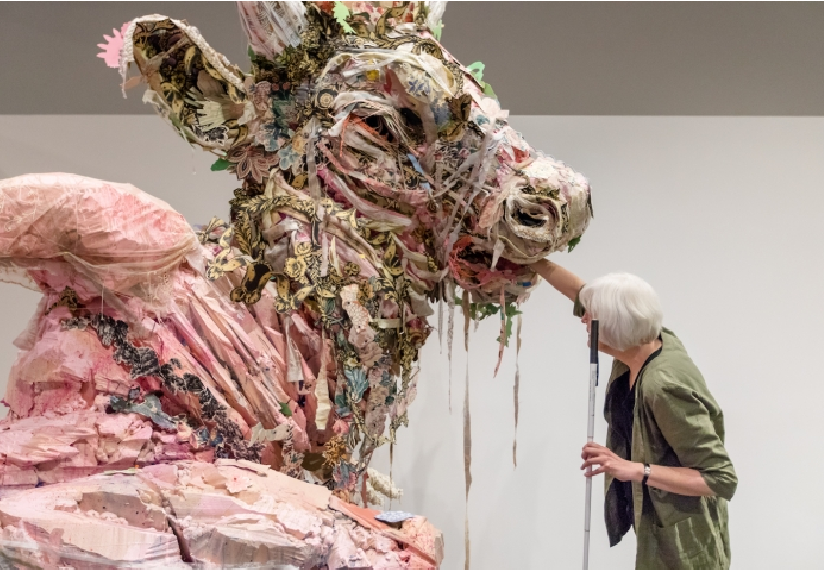
Georgina Kleege touching artwork by Elisabeth Higgins O’Connor (lullaby/lament, 2017) during a Haptic Encounter event at The Contemporary Jewish Museum (The CJM) organized by Cecile Puretz
Artwork commissioned for Jewish Folktales Retold: Artist as Maggid, on view at The CJM, September 28, 2017–January 28, 2018
Photo by Gary Sexton Photography
The Finalists
Bold Idea Award
Rise Up
Creative Community Building
Phil Kongtcheu, Carl Sigmond, Shouxi Wei
Our project will develop a blueprint for an assistive technology makerspace in Cambridge, with an operating manual describing in implementable detail how to create a place where people with various disabilities can find tools and support to design and make assistive devices to suit their needs.
Weaving Together a Resilient Community
Creative Community Building
Yoonjee Koh, Yufan Gao, Janine Whitcomb, Martha Mayo
A collection of histories across disciplines compose an array of tools to rethink productive placekeeping methods in Lowell. Through artistic intervention with participatory community input, this project will deliver freshened frameworks that cultivate collective identities.
